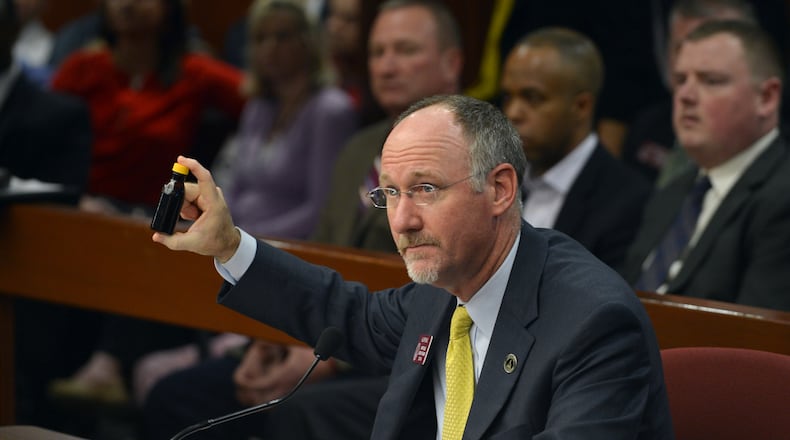State Rep. Allen Peake formally presented his Medical Marijuana 2.0 bill at a House committee hearing on Tuesday, provoking a strong round of opposition from prosecutors and law enforcement officials worried that it would allow more potent pot-distilled oil aimed at a larger list of ailments, diseases and syndromes.
Surprisingly, many members of the House Judiciary Non-Civil Committee pushed back – on Peake’s behalf and against the law-and-order worries.
A previous bill, introduced last year, failed to pass but prompted a study commission that met over the summer. Apparently, things got a bit tense – and prosecutors found themselves excluded from the process.
In his testimony today, Chuck Spahos, executive director of the Prosecutors’ Council of Georgia, said this:
"As I said, I served this summer on the commission. I've been kicked out of nicer places than this before. We still believe that the prosecutors belong and have some say and can be helpful in this process. So we're a little bit disappointed that we're no longer involved in this process going forward."
Specifically, law enforcement officials objected to legalizing oil with a larger THC content – 5 percent rather than 3 percent – and the inclusion of adult conditions that could be treated with the oil. Last year’s bill only addressed treatment for children with uncontrollable seizures. They also testified that the state’s driving-under-the-influence laws were wholly unprepared to deal with abusers.
On the committee, state Rep. Matt Ramsey, R-Peachtree City, took issue with prosecutors’ warnings that the state was headed down a slippery slope, as did Micah Gravley, R-Douglasville, and B.J. Pak, R-Lilburn. Pak had this exchange with Terry Norris, executive director of the Georgia Sheriffs Association – which approved last year’s bill:
Norris: But you had one disorder. Seizure disorder.
Pak: We'll stick with one disorder, then. Adult seizures. What number are you comfortable with, and what number are you not comfortable with – that the sheriff's association would be willing to accept? Less than a thousand or 10,000? I'm talking about people suffering from seizures only. I'm trying to understand where the line is.
Norris: What I'm trying to say is, when you limit it to children with seizure disorders, there was a finite number of people….If there were problems, we would be able to see through these few people.
No vote was taken on the bill.
About the Author
The Latest
Featured




